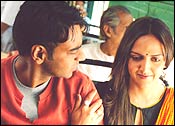Home > Movies > Reviews
Yuva has flashes of Mani's brilliance
R Swaminathan |
May 21, 2004 20:05 IST
 Confession time. I am an unabashed Mani Ratnam fan. And that was the only compelling factor that made me get out of a cosy bed in the morning and travel all the way to a suburban Mumbai theatre to watch Yuva.
Confession time. I am an unabashed Mani Ratnam fan. And that was the only compelling factor that made me get out of a cosy bed in the morning and travel all the way to a suburban Mumbai theatre to watch Yuva.
Now that the easy part is over, let me get to the complex part. Yuva has flashes of the Mani brilliance. But being just flashes, they leave you with a feeling of having tasty starters, but missing out on the main course.
The hollow in the stomach is more for those who have seen the pre-Roja movies of Mani Ratnam. For such fans, a warning: don't go to the theatres expecting an Agni Nakshtram, a Dalapathy, or a Nayakan.
Don't Miss: The Rediff Yuva Special!
For those whose perception of Mani Ratnam has been shaped by the depth of Roja and Bombay and the absolute nadir of Dil Se.., Yuva is a reaffirmation of the oodles of talent the soft-spoken director possesses.
Cinematically, Yuva establishes at least two firsts in Bollywood. The first is the way Ratnam has managed to extend time. It has shades of the 1954 Akira Kurosawa classic Rashômon.
While Rashômon was an exposition of how one single incident seen through different eyes could have numerous interpretations, Ratnam beautifully brings the insulated goings-on in the lives of three characters to a boil in one split-second incident.
 The second is the camera work (Ravi K Chandra) and editing (Sreekar Prasad). Fast cuts and fast motions — instead of the usual and by now predictable slow motions — capture the visual brilliance and energy of Kolkata. Ratnam must be commended for having the courage to go in for a lot of outdoor shooting, where everything from lights to lens can play tricks.
The second is the camera work (Ravi K Chandra) and editing (Sreekar Prasad). Fast cuts and fast motions — instead of the usual and by now predictable slow motions — capture the visual brilliance and energy of Kolkata. Ratnam must be commended for having the courage to go in for a lot of outdoor shooting, where everything from lights to lens can play tricks.
There is another first, which, however, isn't exactly cinematic. And that is the acting of Abhishek Bachchan. The Little B has proved, hopefully once and for all, that he has the ability to come out of the overwhelming shadow of his illustrious father.
As the rough, uncouth, uninhibited and power-hungry Lallan Singh, Abhishek is a revelation. If at all I am asked whose film it is, I would have no hesitation in saying it is Abhishek's. For a mainstream hero to play a character where the shades of black outnumber white and with no redemption in the end, it is a tough task. Watching Abhishek made me feel the cold steel in Lallan's eyes, the soft heart he reserves for his beloved Sasi (Rani Mukerji), and the sheer contempt for his big bad employer, politician Bandopadhyay (Om Puri). Watch out everyone, for this angry young man is here to stay.
The screen chemistry between Sasi and Abhishek reminds one of Arvind Swamy and Manisha Koirala in Bombay. Rani Mukherji as the tough as nails moral foil of Lallan is excellent.
Vivek Oberoi as an unlikely Tamilian flirt Arjun — one of his first shots in the film shows him necking a girl in a train toilet — adds sparkle to the film. The encounters between Mira (Kareena Kapoor) and Arjun sizzle. No matter what the critics say, the Kapoor gal sure has a big screen presence that is hard to escape. Oberoi also makes a believable transition from someone who cares the most about himself to someone who gets involved in politics to clear up the muck.
The weak link, quite surprisingly, is Ajay Devgan. As the idealistic college leader Michael, Devgan's swagger and his mannerisms only seek to reinforce his star image. You watch Devgan on screen and not Michael. Esha Deol as his love interest is just a distraction in the movie. Ratnam could easily have avoided the love angle for Michael.
The biggest downer for the movie is Ratnam's take on politics and elections. If at all elections were so easy, our election commissioners could have sat at home and watched prime-time telly. Ratnam's exposition of electoral practices makes 'Politics for Dummies' look like a book for post-doctoral studies.
The way Devgan and his cronies, all, by the way, in designer jeans and T-shirts, end up in small hamlets in 24 Parganas helping villagers gave me a queasy feeling in the tummy. Ratnam's entire approach towards politics, if one goes by the film, is extremely paternalistic. City slickers coming to a village and empowering people, as if the villagers themselves do not have the capability or the will to change things.